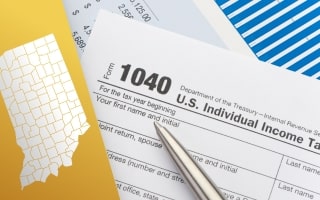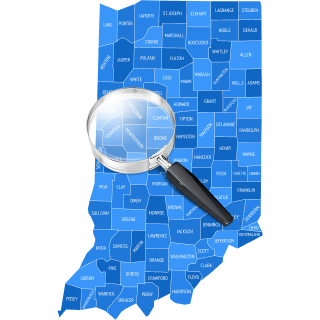Property Tax Records in Indiana

When you own a single-family home, condo, or commercial property in Indiana, you'll receive a property tax bill every year that must be paid to avoid delinquent taxes. The average tax rate in Indiana is just 0.77%, which is well below the national average.
Property taxes in Indiana vary in each county. A county typically determines its tax rate by identifying how much money is needed for its annual budget. Your property taxes are calculated with the assessed value of your home, which isn't the same as the market value. A home's market value is its actual worth. As for the assessed value, it's typically a percentage of the market value.
Property taxes must be paid in two installments. The first installment is due on May 10, while the second one needs to be paid by November 10. Most counties allow property taxes to be paid online. If you make these payments by mail, you'll need to address them to the county assessor or treasurer.
Today, Indiana has low property taxes. However, that hasn't always been true. Before 1973, Indiana had some of the highest tax rates in the country.
Once the property tax relief bill was passed in 1973, a 20% credit was immediately provided to all property owners in the state. Property tax rates were also frozen for a lengthy period to ensure counties didn't raise them. In just seven years, property tax rates fell from around 5% to 2.5%.
Property Tax Assessment in Indiana

Property taxes in Indiana are paid twice every year. Your annual property tax is calculated with the assessed value of your property, which can only be determined once the county assessor knows your home's market value. Before exemptions set in, the assessed value of your home is equal to its market value.
After deductions are subtracted, your home's assessed value will be multiplied by the local tax rate to determine how much you owe. There are, however, several issues that can impact how much you pay, which include the county you live in.
To determine how much property taxes you'll owe for the year, let's say that the value of your home is $200,000 after all exemptions and deductions are subtracted. If you live in a county with a .70% tax rate, multiply your home's assessed value by this percentage.
Keep in mind that tax rates in Indiana are calculated primarily on a per $100 basis, which means that you're charged 70 cents for every $100 that your property is worth. In this scenario, your property tax bill will amount to $1,400 for the year. You can further reduce this bill with tax credits. The average tax rates for five of the top Indiana counties are:
- Marion County: 1.19%
- Lake County: 1.18%
- Allen County: 1.01%
- Hamilton County: 1.06%
- St. Joseph County: 1.07%
As you can see, property taxes in Marion County and Lake County are higher than average, though in general, property taxes in Indiana don't vary much from county to county.
Calculate Indiana Taxes
An Indiana property tax calculator is a smart resource to use when seeking to understand how property taxes are calculated in the state. This tool makes it easy for both homeowners and real estate investors to estimate their tax assessment and annual liability by entering key property details such as location, assessed value, and applicable exemptions.
An Indiana property tax calculator can give you a clearer picture of your annual tax obligations and help identify available deductions and exemptions, such as the Homestead Standard Deduction, the Supplemental Homestead Deduction, and credits for senior citizens, disabled veterans, and surviving spouses. Because tax rates and benefits vary by location, the calculator is a helpful tool for estimating savings specific to your property and county.
using our property tax calculator.
Indiana Property Tax Records: What Are They?

The property taxes that are collected by each county in Indiana are used to pay for public services and other aspects of the budget. Let's say you live in Rising Sun City, which is part of Randolph Township. In this situation, your property taxes will go to nearby community schools as well as the Ohio County Library and Southeastern Indiana Solid Waste.
Whether you own a mobile home or single-family property, you'll need to pay annual taxes. If you are about to buy a home and want to make sure that the property taxes aren't too high, you can find this information by reading the property tax records. All counties maintain tax records of the buildings that fall under their jurisdiction. You can access these records through an online database.
In most counties, you'll be asked to enter an address or parcel ID to find the specific home you're looking for. Once you submit the information, you may see a picture of the property along with some basic information. From here, you can either select the property tax records or pay your bill, the latter of which is useful once you own the home. You can also view the tax bill and see what the money will be used for. The pieces of information that are typically included in property tax records include the following:
-
Tax bill amount
-
Exemptions or deductions that were sought
-
Parcel number
-
Property type
-
Tax unit
-
Mortgage company
-
Tax history
-
Payments
-
Tax overview
-
Assessed values
-
GIS map
-
Previous sales
Property Tax Exemptions and Deductions in Indiana

If you're searching for ways to reduce your property taxes, consider applying for one of the many exemptions and deductions that Indiana provides to homeowners. Most exemptions that Indiana homeowners can qualify for are offered directly by the state. There are, however, some county-specific deductions that you might qualify for depending on where you live.
Homestead Credit: If you own and occupy a home in Indiana, you may qualify for the homestead exemption. Keep in mind that this credit can only be claimed once. It reduces the assessed value of your home by either 60% or $48,000, whichever is less. You could also claim the supplemental homestead deduction, which is a small percentage taken off the assessment after the main credit is factored in.
Age 65 Deduction: If you're at least 65 years old and have owned a home for one year or more, you can claim this deduction. However, the assessed value of your home can't be higher than $240,000. If you qualify, your home's taxable assessed value will drop by $14,000. This deduction often comes with a circuit breaker credit that limits the increase in tax liability to 2% from the previous year.
Disabled Veterans Deduction: If you're a veteran with a service-connected disability, you can lower your home's taxable assessment by just under $25,000. Disabled veterans can claim this deduction as well as an additional exemption that amounts to $14,000. Keep in mind that your home's assessed value can't be higher than $200,000 if you wish to qualify.
Blind or Disabled Exemption: If you own a property and are blind or disabled, you may qualify for this exemption. To receive this exemption, your taxable gross income must be lower than $17,000 for the previous year. The exemption will reduce your taxable assessment by around $12,480. Proof of blindness or disability will need to be provided alongside your application.
How To Search Property Tax Records in Indiana

When you're getting ready to buy a home in Indiana, property tax records can give you the information you need to determine if you're making the right decision. You can find property tax records and all the information they contain with one of two methods. If you're looking to search property tax records in Indiana, you can either search for a home through your county's tax record database or use a third-party tool.
As touched upon previously, every county in Indiana provides the public with access to property tax records and additional information via online databases. While the information in these tax records can differ somewhat from county to county, you should receive a lot of details about the property you're interested in.
You can also search for property tax records with a third-party tool like PropertyChecker. Once you enter this website, you can look for property tax records with search parameters like address, name, owner's email address, or parcel ID. When you conduct this search, you'll receive extensive information about the property, which includes the following details:
-
Purchase history
-
Neighborhood info
-
Property Values
-
Deeds
-
Loan records
-
Property owners
-
Foreclosures
-
Building permits
-
Residents
-
Lien records
How To Appeal Property Taxes in Indiana

When you receive your property tax bill in the mail, it might be higher than you anticipated. Since homes are often mass appraised, the increase to your property's assessed value may be too high. If you find yourself in this situation, Indiana provides homeowners with the means to appeal their taxes.
The appeals process in Indiana used to be complicated and time-consuming. However, it was streamlined in 2017 when the Indiana General Assembly passed Act 386.
Step 1: You can appeal with your township or county assessor once you receive your tax bill in the mail. Review your bill to determine if your home's assessed value is too high.
Step 2: If you want to appeal the assessment value, the filing deadline depends on when you receive your bill. When the bill is mailed before May 1, the filing deadline is June 15. If the bill is mailed after April 30, you'll need to file an appeal by June 15 of the following year.
Step 3: File Form 130, which is the Taxpayer's Notice to Initiate an Appeal. You don't need to submit evidence of an incorrect assessment with the appeal. However, this information must be handed over during the preliminary informal hearing.
Step 4: Once you meet with the county assessor during an informal hearing, they'll make a recommendation to approve or deny your appeal. If the appeal is denied, it will be sent to the local Property Tax Assessment Board of Appeals for further review. If they also deny the appeal, you can ask the Indiana Board of Tax Review to review this decision.
Step 5: When all else fails, it's possible to seek an additional review by the Indiana Tax Court or file an appeal about "objective" issues. Some of the issues that can qualify for an "objective" appeal include the following:
- The property description
- The assessment was made against the wrong person
- A mathematical or clerical mistake was made
- The constitutionality or legality of an assessment is in question
- A deduction or exemption was denied or omitted
How Property Tax Records Impact Real Estate Transactions in Indiana

Property taxes play an integral role in most real estate transactions throughout Indiana. While the average tax rate in the state is lower than the national average, some counties have high rates. Property taxes can adversely affect buyers and sellers in different ways.
When you're buying a home in a place with high property taxes, you'll need to calculate how much your monthly mortgage payments will be. Keep in mind that your mortgage payments might also include HOA fees.
When selling a home in Indiana, taxes can impact the appeal that your property has to prospective buyers. If you live in a county with a tax rate that's higher than the state average, it might be more difficult for you to receive offers for your home.
If you're an investor, you'll also need to consider property taxes before making an offer on a home or apartment building. Property tax payments will increase the amount of money you spend every month. Your property will only have positive cash flow if you earn more income than you spend. If property taxes raise your monthly payments by a sizable percentage, you may be required to increase the rent that you collect from tenants.
Investors can also choose to take part in property tax sales, which are usually hosted by individual counties annually. For example, the Hamilton County Tax Sale is set to take place on September 19. If a homeowner doesn't pay their property taxes, the county can place a lien on their home. If you want to get great deals, especially in less popular areas, you should research tax sales in Indiana more.
Tax liens are eventually sold in public auctions. Investors who purchase tax liens collect interest until the homeowner pays what's owed. If the homeowner doesn't make the necessary payment, the investor who took ownership of the lien can start the foreclosure process.
Free Indiana Property Tax Lookup
Tax Records Please wait...
Property Tax Guide
- Property Tax Records in Indiana
- Property Tax Assessment in Indiana
- Indiana Property Tax Records: What Are They?
- Property Tax Exemptions and Deductions in Indiana
- How To Search Property Tax Records in Indiana
- How To Appeal Property Taxes in Indiana
- How Property Tax Records Impact Real Estate Transactions in Indiana
Instant Access to Indiana Property Records
- Owner(s)
- Deed Records
- Loans & Liens
- Values
- Taxes
- Building Permits
- Purchase History
- Property Details
- And More!
Free Indiana Property Tax Lookup
Tax Records Please wait...
Property Tax Guide
- Property Tax Records in Indiana
- Property Tax Assessment in Indiana
- Indiana Property Tax Records: What Are They?
- Property Tax Exemptions and Deductions in Indiana
- How To Search Property Tax Records in Indiana
- How To Appeal Property Taxes in Indiana
- How Property Tax Records Impact Real Estate Transactions in Indiana